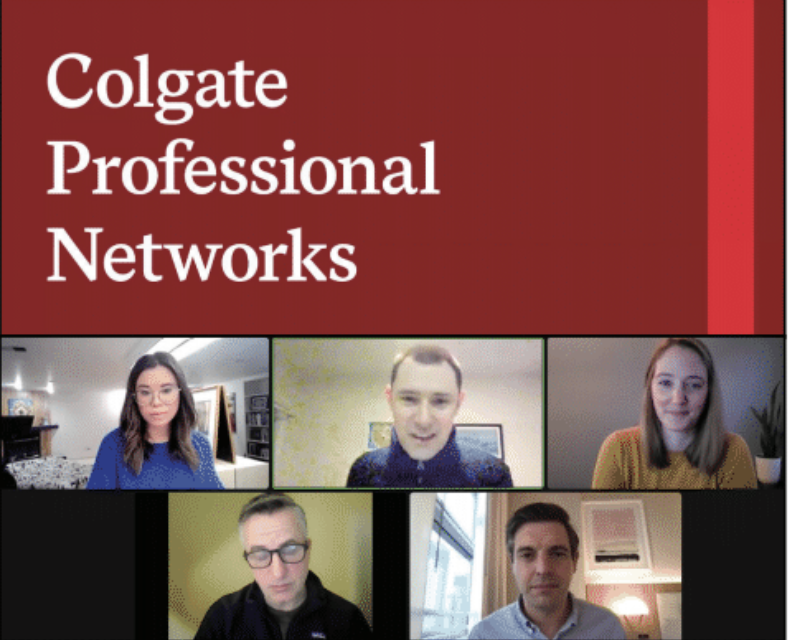“The Great Resignation” Panel Discusses Long-Term Impacts of Pandemic
The Colgate Lawyers Association and Entrepreneur Network collaborated to host a virtual panel on “The Great Resignation,” a term used to describe the turbulence in employment and job trends as a result of the COVID-19 pandemic. As explained in-depth on Tuesday, Feb. 22, when companies were forced to transition to a remote work environment in 2020, more individuals re-evaluated what they really want in a job, which led many individuals to leave their positions amidst economic recession.
The group of panelists who discussed their perspectives on this shift included Vice President and Senior Editor of Forbes Magazine Steve Bertoni ’02, Senior Vice President in Employment Counsel of ViacomCBS John Dabney ’92, Senior Manager of Talent Acquisition at Alvarez & Marsal Katie Lawrence ’05, Director of Strategic Partnerships and Marketing at Energize Colorado Kanitha Heng Snow ’09, and Associate Professor of Economics at Colgate Dean Scrimgeour.
One of the event’s coordinators, David Kusnetz — Chair of the Lawyer’s Association and Litigation Associate in the New York office of Gibson, Dunn & Crutcher — said the topic came about through a desire to center the panel, a collaborative effort with Colgate’s alumni entrepreneur network and alumni relations, around an issue that was current to the broad implications of the COVID-19 pandemic.
“We wanted to talk about something that’s related to COVID-19, thinking, what are some of the phenomena that are arising because of this new paradigm that we’re all facing in this pandemic?” Kusnetz asked. “One of these topics is the Great Resignation – it was a topic that we thought was worthwhile because it touched on so many different aspects of the Colgate Alumni community. There’s legal aspects, human resource aspects, and entrepreneurial aspects.”
According to Kusnetz, the panelists and coordinators hoped to shed light on changing business practices and provide both explanations and advice for their audience. While the alumni networks typically cater their events towards alumni, Kusnetz expressed that students are encouraged to attend these discussions and start thinking about what such changes in job demand mean for their career development.
Among the event’s panelists was Associate Professor of Economics Dean Scrimgeour, who explained the effect of the pandemic on labor demand across firms.
“This has been a time of a lot of volatility in labor markets, more than usual, even more than a usual recession. Typically in a recession, lots of people lose their jobs, but with the pandemic, it’s not just firms saying [they] don’t want to employ these workers anymore, a lot of it is workers saying they’re not really comfortable going to work,” Scrimgeour said. “That’s part of the idea that there’s this great resignation going on—lots of people are reassessing their lives or their jobs and that it’s just not what they want.”
A major theme of discussion during the event was the silver lining that emerged in light of these changes in work conduct and employment. As Scrimgeour touched on, many individuals impacted by the pandemic identified the incompatibilities between their position in a firm and goals in their life and career.
Snow, another panelist emphasized how this was beneficial for entrepreneurs in terms of business development, ongoing flexibility, and opportunities for creativity that arose out of the pandemic.
“After the pandemic hit, students wanted to help in any way they could, as did professionals,” Snow said. “And so, there were many initiatives and organizations that spun up to support pandemic relief efforts,” Snow said. “During a time of change and chaos came opportunity, and the opportunity often involved supporting others in the community. It’s been an exciting time for entrepreneurship, especially social impact focused companies.”
Like Snow, panelist John Dabney was able to identify some resulting advantages from the impacts of the pandemic, emphasizing the importance of remoteness for work that crosses between time zones.
“I do a lot of international work, with different time zones, and as much as Zoom can be absolutely tiresome, there are other aspects of this sort of video call culture that have changed work forever. Business culture has totally changed and I don’t think it’s going back,” Dabney said during the event.
Through discussing these possibly permanent transformations in the culture and structure of work conduct, the panelists aimed to prepare Colgate students and recent graduates for the constantly changing demands and circumstances of employment.
“We also talked about what Colgate grads need to know about going into the workplace. There are the challenges (and benefits) of Zoom versus in person interviews, onboarding as a fully remote worker, and finding community during pandemic times,” Snow said.
Although labor markets and the future of remote work are uncertain for now, Colgate’s alumni networks continue to study the trends and inform the Colgate community about where industries are headed. In order to ensure that the Colgate community stays up to date on these changes, the Lawyers Association and Entrepreneur Network will continue to stay active through Zoom events and supporting Colgate’s workforce members.

Rio Lacey is a senior from San Diego, Calif., concentrating in economics with a minor in political science. She has previously served as Arts & Features...




